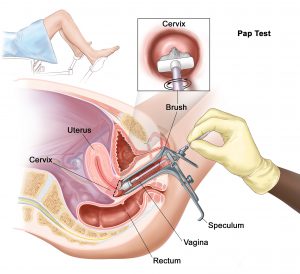
A Pap smear test is a specific medical examination where a doctor evaluates your cervix for signs of abnormal cell changes. The procedure involves a nurse or doctor using a plastic or metal spectrum instrument to hold open your vaginal walls to give them a clear view of your cervix. You should not feel any pain, but you will likely feel slight pressure or discomfort as the speculum holds open your vaginal walls.
Next, they use a small brush or spatula tool to extract a tiny sample of your cervical cells, so they can have your cells examined in a laboratory. The entire procedure does not take longer than a couple of minutes. Afterward, you must wait a few days for the lab results to return. Your doctor will call you once the results are available.
A Pap smear is a critical test for younger and middle-aged women to receive periodically because abnormal cervical cells are an early indicator of cervical cancer. It does not diagnose a high-risk HPV infection, but most abnormal cervical cell changes are linked to it. For this reason, many doctors suggest getting an HPV test and Pap smear test simultaneously.
When to Get the Pap Test
The recommended frequency of getting Pap testing depends on your medical history, age, previous Pap test results, and previous HPV test results.The general recommendations for women getting tested are as follows:
- Women 21 to 24 should receive a Pap test at least once before they turn 25.
- Women 25 to 65 should receive an HPV test at least once every five years. However, it is better to get the HPV and Pap tests done simultaneously every five years. But if you live in a location that does not offer HPV testing, get a Pap test at least once every three years.
- Women over 65 don’t need a Pap smear or HPV testing unless their doctor says otherwise.
Of course, unique circumstances sometimes require you to get tested more frequently. For instance, people with weak immune systems or cervical health problems may need more Pap testing than the average woman. Your doctor will advise you on whether this is the case for you.
What Does an Abnormal Pap Test Result Mean?
If your Pap smear test results come back as “abnormal,” it is the equivalent of the results returning as “positive.” Your first reaction might be to panic but try to stay calm.
Abnormal Pap test results are quite common and do not usually indicate that you will get cervical cancer. These test results could merely indicate your cervical cells appear abnormal. But the results won’t indicate why they appear abnormal, which means the abnormalities may not even be related to an HPV infection.
The Pap test results will grade the abnormal cervical cell changes on a scale from low (minor) to high (serious). If the results are graded high for serious, the cervical cells are precancerous but not cancerous. So, there would likely still be time to treat the condition before it becomes cancerous.
First, your doctor will want you to undergo more testing, such as an HPV test and colposcopy. These tests will help them pinpoint whether an HPV infection and precancerous cells exist. If they do exist, your doctor will recommend advanced treatments like LEEP and cryotherapy to slow down and eliminate the progression of the precancerous cells before they turn cancerous.







